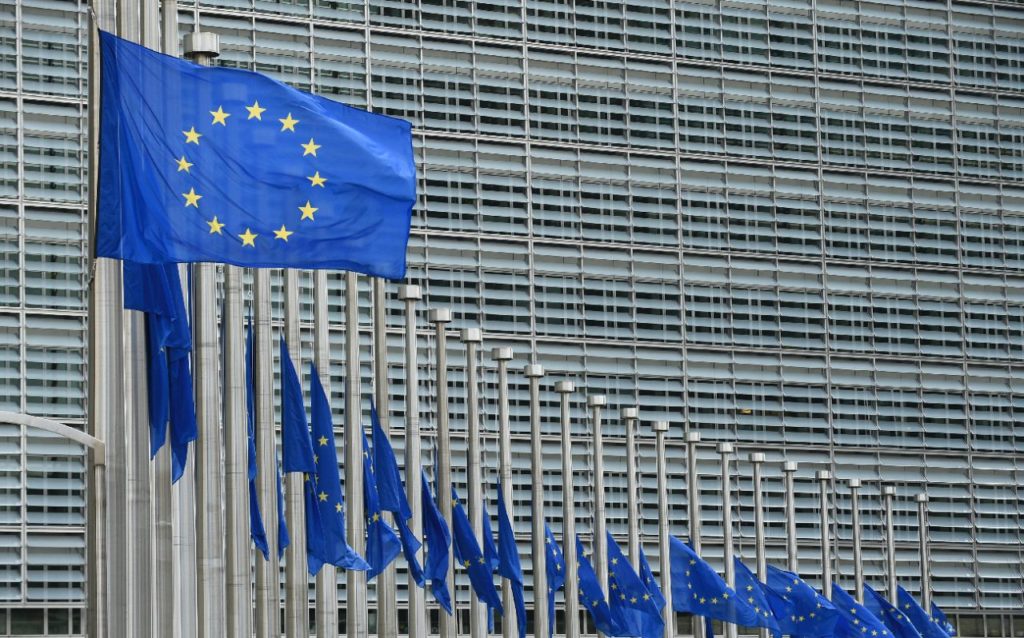BRUSSELS BEHIND THE SCENES
Weekly analysis and untold stories
With SAMUEL STOLTON
Other Brussels behind the scenes stories:
An EU ‘four-shirter,’ for the wrong reasons
Why the UK should never return to the EU
The curious case of the Commission President's mobile phones
In Brussels, a sneeze tells a different story
I’m sitting in the European Commission press room, waiting for the start of the midday briefing. I’m early and no EU officials have arrived as yet. A handful of journalists settle into their seats and open their laptops – primed to voraciously hammer down the story of the day. Suddenly, the sound of a stinging, billowing sneeze reverberates around the room. A miscellany of heads turns in my direction, each conveying their own expression of alarm. It is I, who has sneezed.
This week, the coronavirus arrived in Brussels' European quarter. Across EU bodies, the European Defence Agency became the first branch to contract the disease. The heightening of fears has implored European Parliament President Davide Sassoli to announce that next week's plenary Strasbourg plenary session will take place in Brussels, as a means to contain the spread.
Sent out every Friday afternoon, BRUSSELS BEHIND THE SCENES brings the untold stories about the characters driving the policies affecting our lives. Analysis not found anywhere else, The Brussels Times' Samuel Stolton helps you make sense of what is happening in Brussels.
If you want to receive Brussels behind the scenes straight to your inbox every Friday, subscribe to the newsletter here.
As well as the European Parliament cancelling all events for external guests and visitors for the next three weeks, by the day, other EU institutions are deciding to put a ringfence around their engagements with the wider world - as Europe falls into its own state of quarantined existence.
There is an implicit awareness among those working in the EU quarter that more people have contracted the virus than realise. Each snuffle, splutter or sneeze is regarded as a potential outwardly manifestation of the coronavirus and there is a sense of disquiet among those confined to the vicinity of a would-be infectee. With the relatively mild symptoms not acquiring any outwardly appearance for what is believed to be up to 14 days, those who have been unfortunate enough to catch the illness may not even be aware of it yet.
That being said, the dystopian narrative is slow to take hold in Brussels. In fact, the infection is almost seen as somewhat of a novelty – the peculiar story of a potentially mutable acute respiratory disease, something that has for most of us been confined to the pages of disaster literature, eventually appearing in the real and physical world.
The unknown quantity of the infection is that which grasps the imagination of those working in the EU bubble, as a viral force that has the capacity to remodel a compendium of social norms that have become a staple in Western modes of cultural interaction. In this vein, a novel form of greeting has emerged in Brussels this week.
Attending an EU event recently, attendees were receiving one another by bumping elbows. Meeting a contact at the local pub yesterday, I felt somewhat ashamed to offer my interlocutor my mere fist, which he clasped in his palm and shook delicately. Often such radical revisions to well-established cultural norms take time to substantiate themselves.
BRUSSELS BEHIND THE SCENES POWERED THIS WEEK BY
In other tracts of everyday life, the shame of being publicly registered as ill due to a choice of attire, is holding Europeans back from adoring the face masks that they have stocked up on recently.
"It is extremely dangerous for us all if doctors, nurses and frontline healthcare workers do not have the necessary protective equipment," the EU Commissioner for Health Stella Kyriakidou said at a convening of EU Health Ministers in Brussels this morning. Internal Market Commissioner Thierry Breton meanwhile sounded the same horn, saying that the demand for face masks in particular has soared, resulting in shortages across public health bodies.
In Brussels, this is challenging to fathom. While supplies are understood to be low, you’d be hard pressed to find anyone adoring a face mask - at least in the European quarter. Centuries of social stigma emanating from Europe’s history of sickness – going as far back as the 14th century’s Black Death, which stole the lives of up to 200 million people across Eurasia, have substantiated a Western cultural shame in being regarded as ‘ill.’
That being said, such domineering historic customs may even be subject to gradual erosion, and as the coronavirus spreads more broadly across the continent, people could be less worried about their image and more concerned about preserving their bodily wellbeing.
Pictures of individuals adorning face masks in Italy have been rebounding throughout the news rooms of Brussels today, after it had been announced that the first Vatican official has contracted coronavirus.
Italy has called for more EU assistance in ensuring that the country has a sufficient supply of protective masks, while Czech Health Minister Adam Vojtěch, on arriving in Brussels this morning, told reporters said that his country doesn’t have enough protective equipment, but that the Czechs are now producing their own to meet the demand.
Director of the European Centre for Disease Prevention and Control, Dr Andrea Ammon, said today that 5,544 coronavirus cases have so far been identified across EU and EEA countries, as well as the UK. Italy so far has registered the most cases and across the above regions, 159 deaths have been recorded, as of this morning.
“This is a stress test on the European value of solidarity,” the European Regional Director for the World Health Organization Hans Kluge told EU Health Ministers today. “It is important that we all keep common sense and avoid panic.”
However, the fragility of the human organism in the face of an impending viral epidemic is enough to weaken a principled approach to political unity. Looking around at the faces of my journalistic counterparts amid my bout of intense sneezing in the Commission press room earlier this week, the prevailing reaction to the potential contraction of the coronavirus is not solidarity, but panic. Perhaps the dystopian narrative is emerging, after all.
Sent out every Friday afternoon, BRUSSELS BEHIND THE SCENES brings the untold stories about the characters driving the policies affecting our lives. Analysis not found anywhere else, The Brussels Times' Samuel Stolton helps you make sense of what is happening in Brussels.
If you want to receive Brussels behind the scenes straight to your inbox every Friday, subscribe to the newsletter here.


